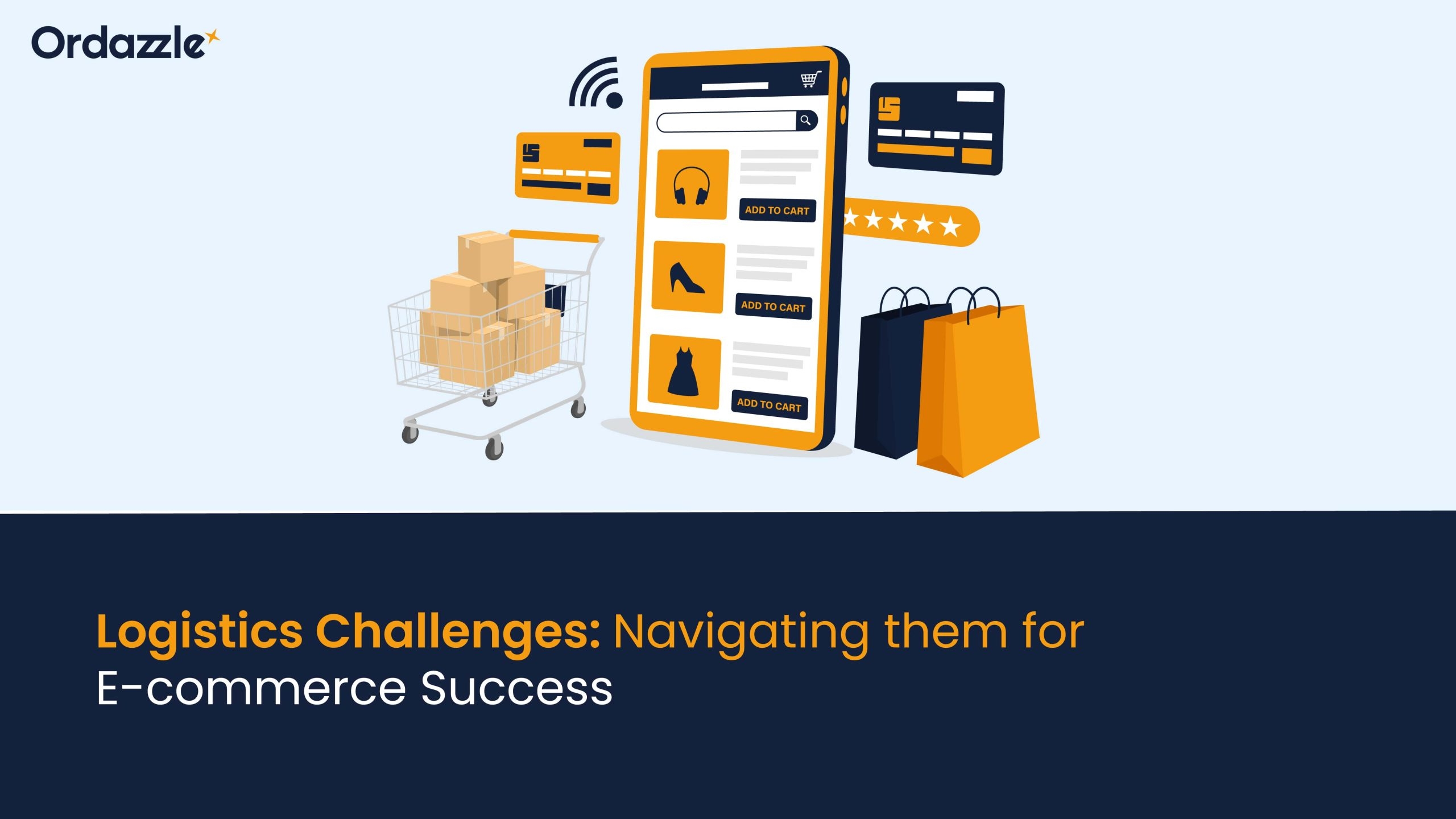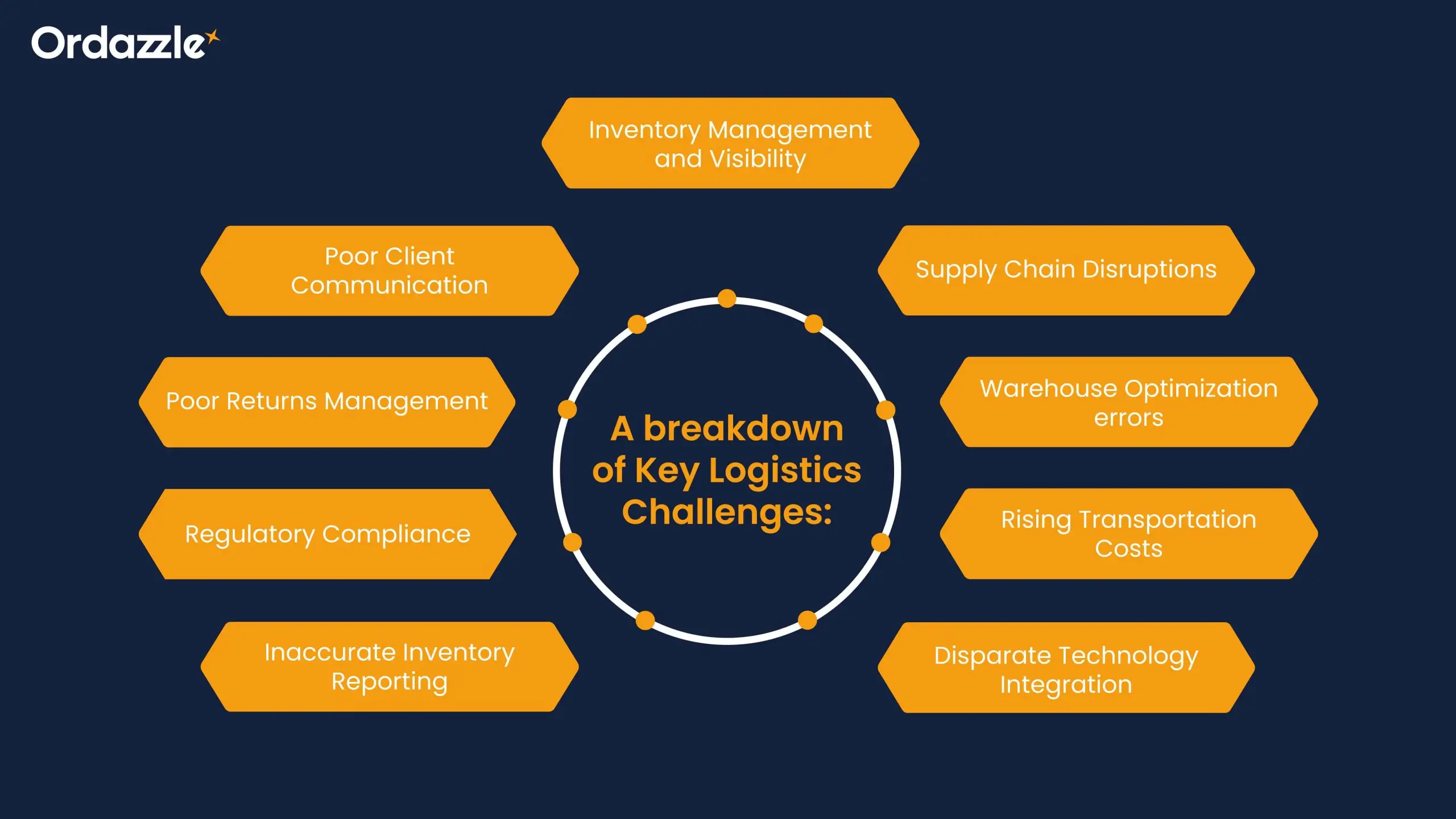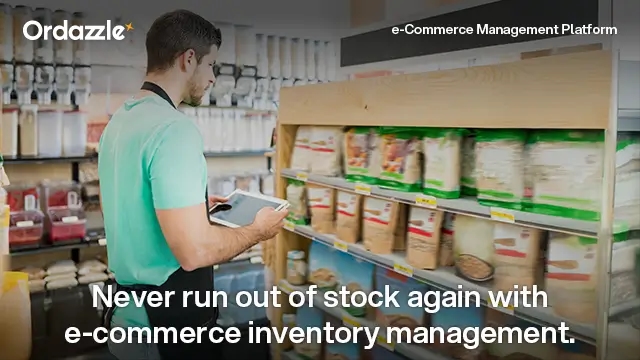Mastering e-commerce Logistics Challenges: Here’s How to Overcome Them

Businesses have faced unprecedented logistics challenges in the wake of the pandemic. While it has exposed vulnerabilities in supply chains, it has also catalyzed a drive among business leaders to revamp and modernize their logistics operations.
The e-commerce sector has experienced explosive growth in recent years, accompanied by a parallel surge in the importance of supply chain management and omnichannel retailing. However, this growth has brought with it myriad logistics challenges that not only strain operational efficiency but also erode customer trust, posing a threat to e-commerce businesses.
So, in this blog, we delve into the key challenges faced by e-commerce businesses in the realm of logistics, shedding light on strategies employed by industry giants to navigate these hurdles successfully.
A Breakdown of Key Logistics Challenges

The logistics industry confronts many challenges, intricately tied to the dynamics of technology and the supply chain. Comprehending these obstacles is vital for organizations seeking to achieve a proactive supply chain network.
Inventory Management and Visibility
Balancing inventory levels while ensuring real-time visibility remains a daunting task. Inaccurate forecasts, fluctuating demand, and fragmented systems often result in overstocking or stockouts, leading to increased costs and diminished customer satisfaction. To overcome such inventory management challenges, businesses should implement advanced technologies for accurate demand forecasting, optimizing inventory levels, and enhancing visibility throughout the supply chain.
Supply Chain Disruptions
External factors like natural disasters, geopolitical tensions, or traffic congestion can disrupt supply chains, leading to last-mile delays and delivery interruptions. These issues frustrate customers, increase costs, and reduce reliability. To address them, a robust logistics management system with improved route planning, better contingency plans, and enhanced global supply chain coordination is crucial.
Warehouse Optimization Errors
Warehouse management involves optimizing space utilization, labor efficiency, and order fulfillment speed. Inefficient layout designs, disorganized inventory, and manual processes can hinder productivity and escalate operational costs. To overcome these challenges, e-commerce businesses can implement automated tracking systems, utilize advanced warehouse management software, and invest in employee training to streamline operations and enhance efficiency.
Rising Transportation Costs
Transportation expenses, which are affected by factors such as fuel prices and driver shortages, can have a substantial impact on a logistics organization’s budget. Every logistics company that wants to be successful while delivering on schedule must manage transportation effectively. This entails keeping a close eye on expenses and implementing strategies to control costs.
Disparate Technology Integration
Integrating different technology systems and making the most of new technologies like AI, IoT, and blockchain still pose a challenge for many logistics companies. Old systems, separate data sources, and a reluctance to change make it tough to adopt advanced technologies, such as logistics software solutions and other e-commerce management tools, that could streamline operations and improve visibility.
Poor Client Communication
Insufficient communication between customers and couriers is a common issue in logistics. This lack of communication can cause delays, misunderstandings, and even loss or damage to items. When distribution logistics fail to provide clear updates on order status, shipping times, and potential delays, it leads to customer dissatisfaction. This negative experience hurts overall customer satisfaction and diminishes trust in your business.
Poor Returns Management
An intricate or inefficient returns management system can be a source of frustration for customers, impacting overall satisfaction and loyalty toward your E-commerce brand. An inefficient return process can contribute to the client’s frustration and significantly affect the overall satisfaction rates, making them shift their loyalty from your business to others in this competitive market. It is one of the major failures of e-commerce logistics management.
Regulatory Compliance
Abiding by the ever-changing regulatory standards is one of the major logistics challenges. E-commerce businesses must navigate through a maze of evolving regulations, particularly in international shipping. Ensuring compliance with these standards is essential to avoid legal issues and maintain operational integrity smoothly. This task requires businesses to fulfill all requirements of shipping standards diligently.
Inaccurate Inventory Reporting
Inaccurate inventory reporting is a common challenge faced by businesses. This issue can occur due to human errors, outdated information, or malfunctions in the systems used for inventory management. The consequences of inaccurate reporting can be serious, leading to missed opportunities for sales and profitability. Additionally, it can result in overstocking or stockouts, impacting customer satisfaction and overall business performance.
Key Strategies To Overcome Logistics Challenges
Overcoming the logistical challenges is not as easy as e-commerce businesses think it is. These practical difficulties may cause major problems for a company’s reputation, shifting the user’s trust and loyalty to other brands. Here are some essential strategies to address the aforementioned common challenges with efficiency.
Data-Driven Decision-Making
Data-driven decisions are essential for efficient logistics management. Utilizing logistics software solutions such as data analytics provides businesses with comprehensive visibility, enabling informed choices on inventory, demand forecasting, route planning, customer behavior, and supply chain performance. Additionally, integrating advanced real-time tracking systems ensures transparency by updating users on order status and location, reducing inquiries, and effectively managing customer expectations.
Supply Chain Diversification
To mitigate the impact of supply chain disruptions, companies are broadening their supply chains by working with different suppliers and setting up alternative transport routes. By partnering closely with suppliers and putting in place risk management plans, they can better handle unexpected situations and make their operations more resilient.
Last-Mile Innovations
Improving the last leg of delivery is vital for enhancing supply chain efficiency. We can achieve this by embracing innovative solutions like route optimization software, self-driving vehicles, and delivery models involving crowdsourcing. Additionally, teaming up with logistics solutions providers who focus on last-mile delivery can give us access to their knowledge and resources, further improving our operations.
Warehouse Automation:
Warehouse automation involves adopting technologies like robotics, RFID tracking, and automated picking systems to make warehouse operations more efficient and accurate. By implementing warehouse management systems (WMS) integrated with e-commerce solutions like enterprise resource planning (ERP) software, businesses can streamline their logistical processes, improve inventory accuracy, and enhance overall efficiency. This helps in better managing inventory and ensuring smoother workflows inside and outside the warehouse.
Digital Transformation
Digital transformation is key for logistics companies to modernize operations and stay competitive in today’s fast-changing landscape. By adopting the latest technologies, such as AI, ML, or IoT, businesses can significantly improve the accuracy and efficiency of their logistics operations. These technologies help streamline processes and enhance overall performance, enabling companies to keep pace with industry trends and better serve their customers, ultimately driving success in an increasingly digital world.
Continuous Monitoring & Improvisations
Consistently keeping an eye on your logistics and delivery processes and making improvements can boost your e-commerce business’s efficiency. It’s all about regularly checking how things are going, gathering feedback from your clients, and figuring out where you can do better. This ongoing monitoring and tweaking ensures that your logistics operations stay flexible and effective for your customers.
Strengthen Communication At All Levels
Enhancing communication at all levels is vital for navigating logistics challenges and ensuring business survival. Strengthening connections with your global supply chain partners is essential. Even if your business operates locally, reaching out to distant logistics firms can broaden your market reach. Regular communication with suppliers is crucial for staying updated on resource availability. Real-time communication, especially for tech support, is key to addressing logistical issues promptly. During emergencies, an experienced IT team can minimize downtime by setting up cloud services and IoT devices for seamless communication between warehouses, transportation companies, and other supply chain members.
Reliable Logistics Solutions Partners
Partnering with reliable logistics providers is crucial for timely delivery and client trust. Opting for unreliable options can lead to financial losses and harm reputation. By partnering with e-commerce logistics solutions providers, you gain the ability to manage specific logistics operations like transportation or warehousing efficiently, providing scalability and simplifying supply chain oversight.
Overcome Logistics Challenges In Partnership With a Leading E-Commerce Solution Provider
With the many challenges that come with the supply chain, your approach to overcoming them can make or break your business in such crucial times. Many successful e-commerce businesses are turning to other logistics partners to navigate the supply chain crisis.
In this shift, Ordazzle, a leading e-commerce solution provider, leads the way. Our logistics management system and software solutions, supported by a proven track record, make us the perfect partner for companies striving in the supply chain. With our integrated systems, businesses can easily manage all logistics providers and track multiple orders across various marketplaces and carriers simultaneously.
Contact us to learn more about our logistics solutions and see how we can help your business adapt and succeed with ease.


